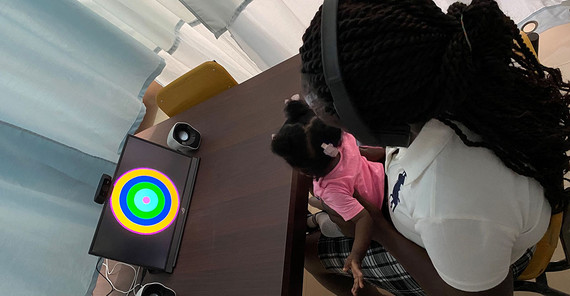"Specifically, we tested 40 babies aged six months in Accra, the capital of Ghana in West Africa," says co-author Natalie Boll-Avetisyan, Professor of Developmental Psycholinguistics at the University of Potsdam. The special thing about the babies in this study is that they usually grow up multilingual and hear between two and six languages every day. Children in Ghana are often cared for and brought up not only by the nuclear family, but by many adults who live together in the same house and often speak different languages, including Ghanaian languages such as Akan, Ewe, Ga, and Krobo, but also English. "We tested whether the little babies react to vowel harmony," the linguist says. This phonetic pattern exists in many languages around the world and determines that vowels within a word must be similar. Among the languages spoken in Accra, only Akan has such vowel harmony. "Our results show that Ghanaian babies prefer to hear invented, meaningless pseudo-words that show vowel harmony rather than pseudo-words that are not harmonious. And this preference does not depend on whether children listen to Akan a lot or a little in their everyday lives."
At the BabyLAB in Potsdam, where the focus has been on children's language acquisition and experimental research for more than 20 years, a similar study was carried out a few years ago with babies learning German and Turkish. "The method of the study in Ghana was based on this one, but we had to adapt some things to the particular circumstances in Accra, because – unlike in Potsdam’s BabyLAB – we didn't have access to an established infrastructure there," Natalie Boll-Avetisyan adds. An effort that was worth it, as the researcher emphasizes: "Previous research into children's language acquisition has been limited to two percent of all the languages spoken in the world. The languages learned by children around the world are sometimes strikingly different in their structures, but the living conditions in which children grow up are also sometimes very different. Only if our research becomes more global will we fully understand how the human mind is capable of learning languages."
The study on the web:
Omane, P. O., Benders, T., & Boll-Avetisyan, N. (2024). Vowel harmony preferences in infants growing up in multilingual Ghana (Africa). Developmental Psychology. In press. DOI: https://doi.org/10.1037/dev0001776
Contact: Prof. Dr. Natalie Boll-Avetisyan, Professor of Developmental Psycholinguistics
E-Mail: natalie.boll-avetisyanuuni-potsdampde
Phone: +49 331 977-2374
Media information 09-07-2024 / No. 069

